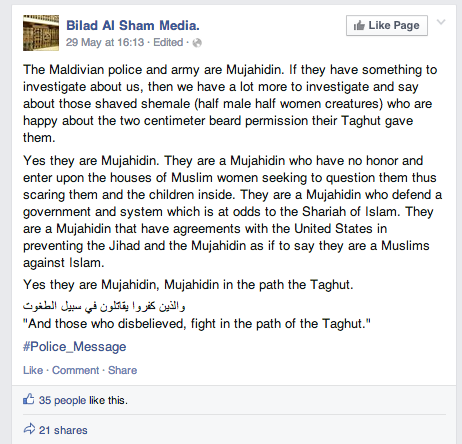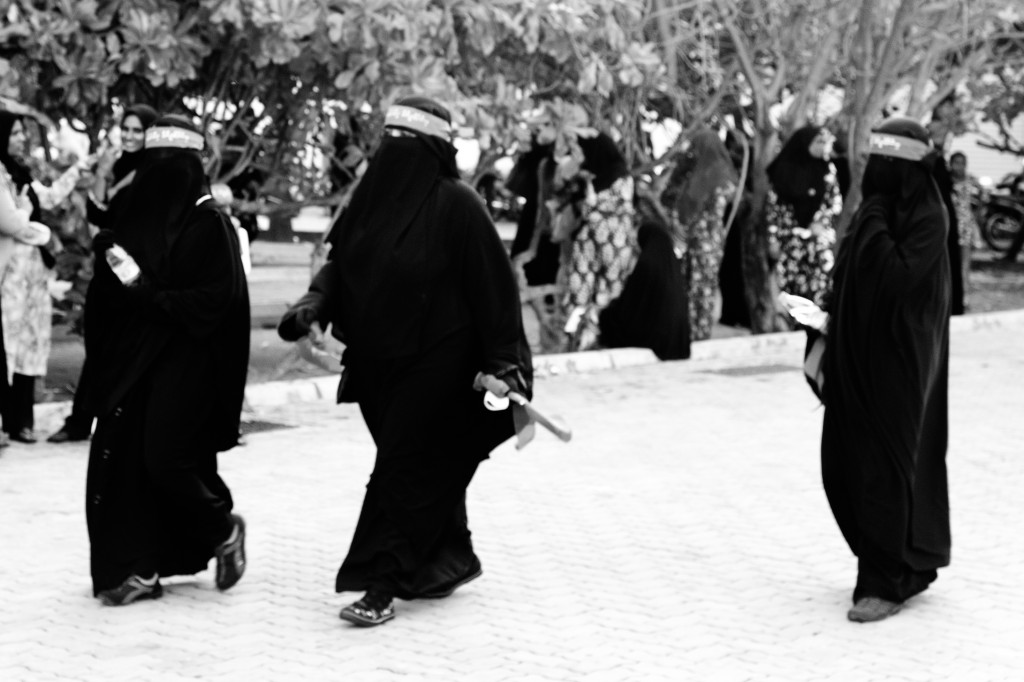Does this government support Maldivian Jihadists in Syria?
Azra Naseem
In the last week two Maldivians died in the Syrian conflict. About twenty more are fighting in the war. The news was brought to local papers by a group calling itself Bilad Al Sham Media, which insists furiously that it is run by a group of Maldivians based ‘in Syria, not in the Maldives’. Bilad Al Sham refers to what is known as Greater Syria, currently the main attraction for the world’s Jihadis who are lured to the conflict by what many believe is a divine promise that jihad there ‘will set the stage for the emergence of the true Islamic state’.
According to the Lebanon-based newspaper Al-Akhbar, the various nationalities currently fighting in Syria—Lebanese, Jordanians, Iraqis, Palestinians, Kuwaitis, Tunisians, Libyans, Saudis, Yemenis, Afghans and Pakistanis—are divided among many factions and schools of thought. Three among them espouse the most hardline takfiri ideology: al-Qaeda’s Abdullah Azzam Brigades, the Doura Fighting Group, and the Jabhat al-Nusra li-Bilad al-Sham. The Bilad Al Sham Media group, which appears to have been set up for the purpose of publicising the activities of Maldivian ‘Jihadis’, has confirmed that the Maldivians are with Jabhat al-Nusra, the deadliest of the three.
Al-Nusra first announced its existence in January 2012, pledged allegiance to al-Qaeda in 2013 and in April 2014, started its own weapons factory. To remove any doubt about Maldivian fighters being affiliated with Jbhat Al-Nusra, Bilad Al Sham Media posted an Al-Nusra issued identity card which it says belonged to the second Maldivian who died in the conflict. Affiliation with Al-Nusra is a matter of great pride for them.
Bilad Al Sham Media has a strong online presence—it has a Facebook page, a Twitter handle, a YouTube channel, and a blog. The group is making full use of all the platforms to bring detailed news of their activities in Syria to the Maldivian public. According to its Facebook page discussions with followers, the decision to go public was not made lightly. It was aware that being out in the open could mean that future Jihadists would find it more difficult to leave the country and join others in Syria as authorities crack-down on them. But, in the end, it decided that the gains of going public—calling others to ‘Jihad’ and attracting them to their cause—far out-weighed the potential harm.
Bilad Al Sham Media appears to have been spot on in its calculations: they have got a far bigger response from their followers and wanna-be Jihadis than from the government. Whereas the glorification of their ‘martyrdom’ has increased with the publicity, the government response has been virtually non-existent. Maldivian Jihadists, it appears, have nothing to fear from this government. In fact, the government appears to be tacitly condoning the whole enterprise if not actively encouraging it.
Bilad Al Sham Media warned the police not to investigate them, and instructed the Islamic Ministry to stay out of it.
The Maldivian Islamic Ministry should remain in its boundaries (Maldives) and not comment on political issues of other nations such as Syria
— Bilad Al Sham Media (@BiladAlSham_Dhi) May 28, 2014
The Islamic Ministry is following the instructions to a tee. Minister Sheikh Shaheem Ali Saeed responded to news of the Maldivian suicide bomber by saying that while he personally disapproved of Maldivians fighting in wars abroad, the Islamic Ministry itself had nothing to say on the matter.
President Yameen, meanwhile, has come out with a statement that makes suicide bombing in Syria sound similar to a minor transgression such as throwing some rubbish on the streets of Singapore where there are strict regulations against such behaviour.
Yameen said that the government had always urged Maldivians to maintain discipline abroad, adding that the responsibility for any crime wilfully committed by an individual must be borne by the individual himself.
Bilad Al Sham Media has made it clear that Maldivians in Syria are well trained fighters killing in the name of God; not ‘a family of Maldivians’ who, while travelling abroad, have somehow found themselves in a bit of a kerfuffle in Syria, as Yameen appears to suggest. Rest of the president’s utterances on the subject, offering financial assistance to the fighters if they have found themselves stuck in Syria, smacks of someone who is totally ignorant of the phenomenon of violent radicalisation or is having a private laugh about it.
Does the government’s astonishingly blasé attitude to one of the most pressing security concerns in the world today stem from ignorance, or is it calculated? Is the government deliberately turning a blind eye to the radicalistion—both violent and non-violent—of Maldivians? Does it consider the ‘Jihadists’ to be engaged in a Holy War to protect Islam? Its actions, or lack of them, since the news broke certainly suggests this to be the case.
Most people were still reeling from the shocking news of the Maldivians killing and being killed in Syria when the national Martyr’s Day rolled around on Friday, 30 May. Death of the second Maldivian had been announced only three days before. Bilad Al Sham Media was busy putting out statements promoting their deaths as martyrdom, a Jihad for Islam, when Foreign Minister Dunya Maumoon addressed the nation on the occasion of Martyr’s Day. Shockingly, in all the talk of martyrdom, she had nothing to say about the Maldivians dying in Syria. Still conspicuously not remarking on the Syrian ‘Jihadis’, she defined martyrdom as ‘loss of one’s life from an attack by the enemy in a Jihadi war being fought for religion and for the country’s freedom’. She later said, ‘if we were to lose our lives during a sincere effort to protect our country’s sovereignty, that death will without a doubt be martyrdom.’ There was no such clarification of whether or not the government considers those killing themselves and others in Syria fits into her definition of martyrs for religion.
Other government officials were even more vague. Here is, for example, Vice President Mohamed Jameel Ahmed’s Tweet to mark the occasion:
May Allah grant eternal paradise to the brave martyrs of our country. We shall forever be grateful for their great sacrifice! — Mohamed Jameel Ahmed (@MJameelAhmed) May 30, 2014
Which martyrs is he speaking of? The Maldivians ones of days long gone who died fighting for the country’s freedom, or the self-proclaimed Jihadis killing and being killed in Syria?
Never the sort to waste an occasion for nationalistic rhetoric, on Saturday evening the government held an official ceremony to mark Martyr’s Day. As Chief Guest, Home Minister Umar Naseer added to the ambiguity. He focused on the changed nature of modern warfare, saying that days of fighting with swords and guns are long gone. Today’s war, he said, is ideological; what is under attack are ‘how people think of their countries, and their religion.’ There was no mention of whether or not he, or the government, considers Maldivian ‘Jihadis’ fighting in the Syrian war as soldiers in that ideological war.
Added to this recurring ambiguity is total inaction. Although it is the Maldives Police Service (MPS) which has a dedicated counter-terrorism department, recent media reports have quoted the police as saying Maldives National Defence Force is responsible. In this case, however, the buck seems to have been passed to MPS. Bilad Al Sham Media, which has warned the police that probing into their activities is anti-Islamic, is right not to be too concerned. The MPS was unable to identify Justice Abdulla Hameed from the leaked sex videos despite his identity being obvious to the naked eye. And, it was only in last October that the MPS Counter-terrorism chief flew to London with a ballot box for the presidential election and disappeared only to be found when he posted pictures of himself at an Arsenal football match.
In addition to the cluelessness, it is not just Bilad Al Sham Media that is warning police that investigating their ‘Jihad’ is anti-Islamic.
 They were recently told the same thing by hardline Salafi preacher Sheikh Adam Shameem Ibrahim (of Andalus fame) selected by the government to address the police on the occasion of Martyr’s Day. What he had to say to the police is not the least bit surprising. He recast national heroes of history in today’s Islamist terms— ‘Mujahedin who had martyred for Islam’ and the country. He said all police should always be determined to become a martyr, and took pains to tell the force just what a glorious position Islam has for martyrs. Nothing, of course, was said about it being wrong to blow themselves up, and kill others, in the name of Islam in the Islamists’ ‘Holy War.’
They were recently told the same thing by hardline Salafi preacher Sheikh Adam Shameem Ibrahim (of Andalus fame) selected by the government to address the police on the occasion of Martyr’s Day. What he had to say to the police is not the least bit surprising. He recast national heroes of history in today’s Islamist terms— ‘Mujahedin who had martyred for Islam’ and the country. He said all police should always be determined to become a martyr, and took pains to tell the force just what a glorious position Islam has for martyrs. Nothing, of course, was said about it being wrong to blow themselves up, and kill others, in the name of Islam in the Islamists’ ‘Holy War.’
The government’s non-action; its sanguine reaction to the news of Maldivians fighting in Syria; its complete lack of any counter-extremism or counter-radicalisation initiatives; its failure to state its position on whether or not it regards the Maldivian fighters who died in Syria as martyrs or not; and its sanctioning of an Islamist preacher to glorify martyrdom to the Maldives Police Service all combine to make a very loud statement—this government tacitly supports Maldivians fighting and killing themselves in the ‘Holy War’ to establish an Islamic state in Syria. Interesting, given that the Jihadists themselves have little respect for it; and we have already had some experience of what Islamists do to governments they have no respect for.


